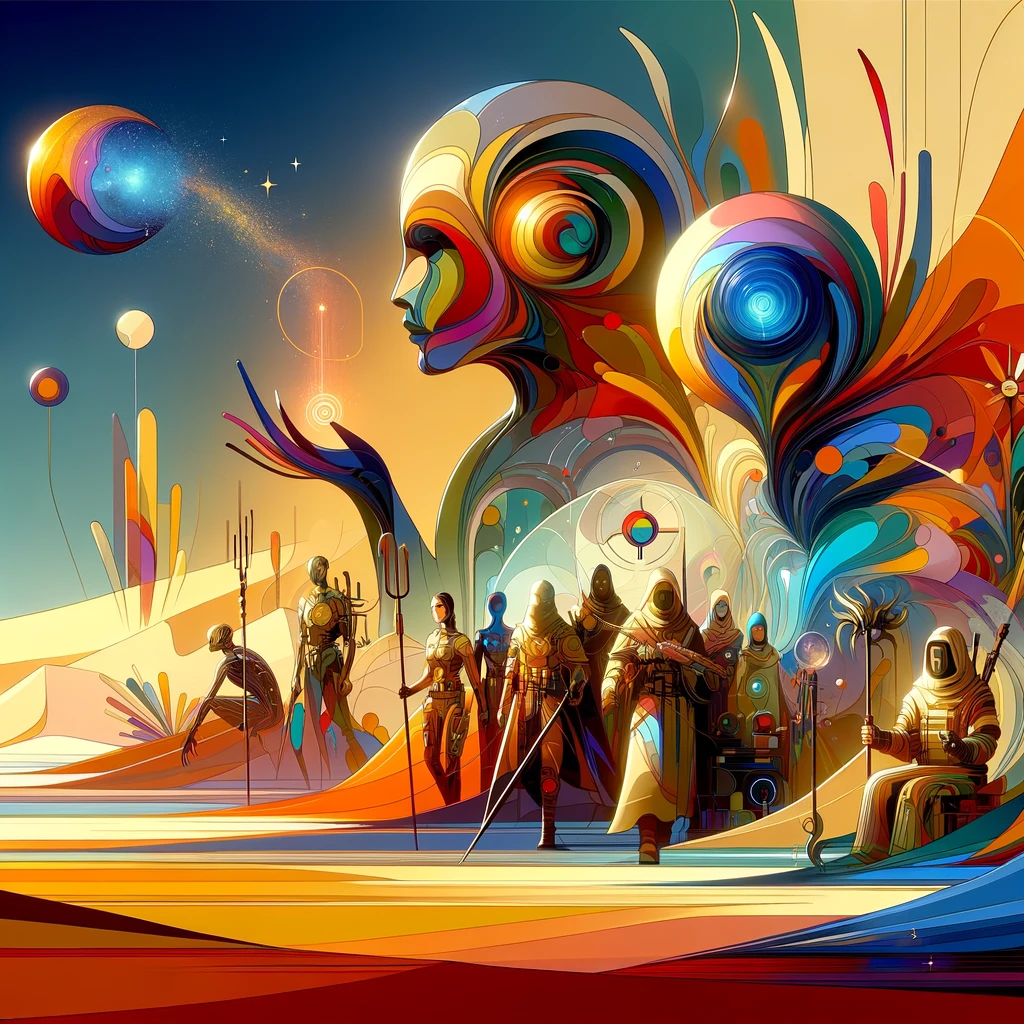This is a reflection and commentary piece after seeing the movie, Dune 2, in theaters
SPOILER ALERT: I’ll be spilling some stuffs about Dune 2! Consider yourself warned!
Table of Contents
Introduction
Cognitive Revolution
Agricultural Revolution
Scientific Revolution
Conclusion
Tangential Topics
–Psychedelic experiences
–Love and relationships
Introduction
In this commentary, I present my perspective as an inquisitive person profoundly influenced by the narratives that shape our society, especially after viewing the movie Dune 2, a sci-fi book-turned-movie adaptation, during my ongoing exploration of the historical non-fiction book “Sapiens.” I want to make it clear that I’m not an expert in history or science fiction. Instead, these insights come from my personal reactions to the significant societal themes in Dune Part 2, which resonated with me deeply.

Although I haven’t read the Dune book series, my reading of “Sapiens” has enriched my understanding of the critical human experiences mirrored in the film. Set against a sci-fi backdrop, Dune’s storyline reverberates with the three critical revolutions—cognitive, agricultural, and scientific—highlighted in “Sapiens,” which have directed the course of human history. This personal essay reflects my attempt to articulate how a sci-fi story can mirror non-fictional historical themes, offering a lens through which we can examine our past, interrogate our present, and consider a future that, unsettlingly, doesn’t feel entirely out of reach.

So as of today, Saturday, March 9th, 2024… I’ve read about 30% of the book, currently in the middle of the Agricultural Revolution section. To enhance my engagement with this book, I’ve decided to adopt a unique approach for my personal essay, let’s call it a “fluid-essay”! This evolving piece will progressively unfold as I navigate through “Sapiens,” with each segment reflecting upon corresponding themes within the renowned sci-fi saga turned film, “Dune.” So at this point, I will focus on the Cognitive Revolution, since I’ve finished that portion of the book, Sapiens. The idea is to capture my evolving reflections, allowing myself (and readers of this post) to witness the growth of my understanding and insights as I progress through the book. By the end, I aim to synthesize these reflections into a comprehensive summary analysis, offering a nuanced perspective on the intertwining narratives of human history and speculative fiction. Thanks for joining me on this journey!
Cognitive Revolution
Sapiens (historical lens)
In Yuval Noah Harari’s “Sapiens,” we learn how the cognitive revolution, occurring between 70,000 to 30,000 years ago, transformed the way humans think and communicate. This pivotal shift allowed people to discuss abstract concepts, not just their immediate environment, fostering a newfound ability for large-scale cooperation essential for societal progress. Gossip, as Harari intriguingly points out, played a crucial role in this evolution, enabling humans to become self-aware and understand the importance of social alliances. The key to uniting vast numbers of individuals, he suggests, lies in the power of shared myths and stories.
Harari elaborates that these myths underpin the foundations of our most complex structures: religions, legal systems, and nations are all built on collective beliefs, none of which hold tangible existence outside the human imagination. These shared narratives allow us to collaborate on unprecedented scales, constructing vast cities and mighty empires.
Dune (sci-fi lens)
“Dune” offers a compelling parallel to this concept through the enigmatic Bene Gesserit order, an entity that subtly shapes the universe’s socio-political fabric under the guise of religious and moral guidance. Central to their agenda is the Golden Path, a grandiose scheme to direct human evolution and society towards a meticulously orchestrated future, utilizing a rigorous breeding program to create the Kwisatz Haderach, a being of unparalleled power.
Enter Paul Atreides, a key character in this elaborate plan, who embodies the Bene Gesserit’s aspirations yet ultimately subverts their expectations. Raised on Arrakis amidst the prophecy-revering Fremen—prophecies the Bene Gesserit themselves manipulated via the Missionaria Protectiva—Paul’s destiny unfurls in unexpected ways. His encounter with the potent spice melange awakens formidable abilities, aligning him with the Fremen’s messianic visions.

However, Paul’s arc deviates from the conventional hero’s journey, highlighting the problematic nature of prophetic and messianic leadership. Though poised as a liberator, his ascent triggers a violent crusade across the stars, contradicting the salvation narrative and emphasizing the unintended consequences of his rise. Paul is not the infallible savior he’s perceived to be but a product of calculated schemes and broader socio-political machinations, a poignant reminder of the perils embedded in uncritical hero worship and the intricate dance of fate and agency.
Present day (current lens)
You know, this part is not easy for me to articulate, and I feel a bit embarrassed to acknowledge my naivety regarding the current global landscape, largely shaped by my consumption of bite-sized content from platforms like TikTok and Instagram Reels. Nonetheless, I am committed to approaching this topic with as much diligence and insight as I can muster. It seems undeniable that the collective imaginations shaping our modern society are vivid and forceful. In America, for instance, potent ideologies like nationalism, religious fervor, and the adoration of wealth and power persistently sculpt our shared reality.
Today, echoes of the past resonate in the present, where exploitation and conflict continue unabated. Situations like the ongoing conflicts and humanitarian crises in places like Gaza and Congo starkly illustrate how certain narratives and beliefs justify the exploitation and suffering of many for the comfort of others. These scenarios often hinge on collective beliefs—whether they be economic benefits, territorial rights, or religious convictions—that validate these tragic realities.
Our society collectively subscribes to various constructs, like the value of currency or the concept of national borders, which exist solely in our shared imaginations. Similarly, our legal and moral frameworks, which dictate right from wrong, are testament to the enduring power of collective beliefs. These imagined realities, though intangible, have tangible consequences, influencing our actions and shaping the world we navigate daily.
Summary
In weaving together insights from Yuval Noah Harari’s “Sapiens” and the sci-fi universe of “Dune,” juxtaposed with our present-day realities, this exploration dives deep into the power of shared myths and collective imaginations across different epochs and civilizations. From the cognitive revolution that reshaped early human society by fostering complex communication and collaboration, to the intricate socio-political ploys within “Dune’s” universe orchestrated by the Bene Gesserit, we observe a common thread: the profound impact of collective beliefs in shaping human destiny.
“Sapiens” articulates how shared myths have underpinned the rise of vast empires and complex societal structures, binding large groups of people together under common goals or beliefs. Similarly, in “Dune,” we witness how orchestrated beliefs and prophecies can steer the course of an entire galaxy, highlighting the power and perils of messianic and prophetic leadership.
Reflecting on our current era, we see these dynamics still at play, where collective narratives drive national, economic, and moral frameworks, often leading to profound and sometimes troubling outcomes. As we draw parallels between the distant past, speculative futures, and our own time, we recognize the enduring influence of shared myths — whether they propel us toward greatness or lead us astray.
In conclusion, this journey through different lenses — historical, fictional, and contemporary — underscores a timeless truth: the stories we believe in collectively not only define our reality but also shape our future. By examining these narratives critically, we can better navigate our world and perhaps steer it toward a more enlightened path.
Agricultural Revolution
Today, March 20, 2024, fresh from rewatching Dune 2 and completing the Agricultural Revolution chapter in “Sapiens,” I’m diving into part two of this essay. Dune 2’s cinematic brilliance struck me profoundly, captivating me as much on the second watch as the first. Pairing this with my recent read from “Sapiens” has enriched my understanding, particularly how the book’s themes resonate with the narrative depth and character motivations in Dune 2, creating a layered and immersive experience.
Sapiens (historical lens)
Fast-forwarding a few millennia from the Cognitive Revolution, the Agricultural Revolution built upon these cognitive advances, transforming human societies and their interaction with the environment. While the Cognitive Revolution endowed Homo sapiens with unprecedented cognitive abilities and social structures, the Agricultural Revolution utilized these capacities to tether human destiny to the cultivation of select species, drastically reshaping the landscape of human existence and setting a new course for future generations. As described in ‘Sapiens,’ this era did not merely introduce farming; it fundamentally altered human relationships, social structures, and individual lives. Harari controversially suggests that instead of humans domesticating plants first, these species domesticated us, luring Homo sapiens into a lifestyle that, paradoxically, shackled them to more laborious, less varied, and often less nutritious livelihoods. This epochal transition led to the growth of villages, cities, and eventually large states and empires, setting the stage for unparalleled social complexities and inequalities. Through this lens, the Agricultural Revolution is not just a tale of human triumph over nature but a complex narrative that raises essential questions about progress, happiness, and the essence of human endeavor.
This profound transformation of human society and its relationship with the environment, as narrated in ‘Sapiens,’ finds an intriguing echo in the universe of ‘Dune 2.’ In this sci-fi saga, the meticulous cultivation and fierce control over the desert planet Arrakis and its invaluable resource, spice, reflect the Agricultural Revolution’s themes of domination and dependency. Just as early humans learned to cultivate and rely on specific crops, the characters of ‘Dune 2’ grapple with the power dynamics and survival intricacies tied to a single, life-altering resource. Dune’s narrative underscores how the mastery and manipulation of natural resources can shape civilizations, echoing the lasting impact of the Agricultural Revolution on our own world’s history and future.

Dune (sci-fi lens)
In ‘Dune 2,’ Chani’s poignant reflections and the unfolding events encapsulate the dualities of human progress and moral quandaries, echoing the nuanced repercussions of the Agricultural Revolution. Chani’s insistence on staying true to oneself juxtaposes Paul’s trajectory, who, in pursuit of destiny, sacrifices personal bonds and ethical clarity, mirroring how societies anchored to agriculture might have forsaken earlier harmonies with nature for perceived advancement. Her foreboding question at the beginning of the movie about the next oppressors of the people in Arrakis mirrors the shift from a world of relative equality among foragers to one where agricultural societies laid the groundwork for hierarchies and dominion.
“And who will our next oppressors be?”
-Chani
Furthermore, the raw emotion Chani exhibits upon feeling betrayed and Paul’s rationalization of his crusade illuminate the human capacity to cloak ambition and dominance in the guise of higher purposes. Just as the Agricultural Revolution cultivated a lifestyle fraught with new social stratifications and conflicts, ‘Dune 2’ portrays liberation and righteousness in shades of vengeance and conquest, challenging viewers to reflect on the true cost of progress and the moral complexities in shaping civilizations. Thus, the characters’ journeys in ‘Dune 2’ profoundly echo the transformative, yet contentious path humanity embarked upon with the dawn of agriculture, raising timeless questions about identity, power, and the essence of being human.

Present day (current lens)
The relentless pursuit of control over natural resources in today’s world, akin to the spice obsession in ‘Dune 2,’ unveils stark similarities in how both are vital yet lead to exploitation and conflict. This modern-day scramble not only powers our industries but also shapes geopolitical dynamics, often compromising vulnerable communities and the environment.
Equally distressing is the industrial farming sector’s treatment of animals. In these farms, animals endure immense suffering for the profitability of a few and the convenience of many, mirroring the exploitative essence of resource extraction depicted in ‘Dune 2.’ Just as the quest for spice in the movie reveals deeper ethical and ecological conflicts, the systemic cruelty in animal agriculture prompts a reevaluation of our values and the consequences of our consumption.
“Immediately after birth the calf is separated from its mother and locked inside a tiny cage not much bigger than the calf’s own body. There the calf spends its entire life - about four months on average. It never leaves its cage, nor is it allowed to play with other calves or even walk - all so that its muscles will not grow strong. Soft muscles mean a soft and juicy steak. The first time the calf has a chance to walk, stretch its muscles and touch other calves is on its way to the slaughterhouse. In evolutionary terms, cattle represent one of the most successful animal species ever to exist. At the same time, they are some of the most miserable animals on the planet”
-Harari. Sapiens
Harari’s insights resonate here, emphasizing how myths and constructed narratives have historically facilitated human cooperation but also justified exploitation. Today, similar narratives may blind us to the moral costs of our lifestyles, particularly in how we treat other sentient beings for food.
This reflection encourages us to question the legacy we contribute to, urging a critical examination of our interactions with both the environment and non-human animals. By confronting these realities, we might foster a more compassionate and equitable world, mindful of the past and responsible for the future.
“Myths, it transpired, are stronger than anyone could have imagined. When the Agricultural Revolution opened opportunities for the creation of crowded cities and mighty empires, people invented stories about great gods, motherlands and joint stock companies to provide the needed social links.”
-Harari. Sapiens.
Summary
Building upon insights from “Sapiens” and “Dune,” this analysis contemplates the Agricultural Revolution’s transformative influence and its parallels with the thematic intricacies of “Dune 2” and contemporary global resource challenges. It illuminates how the societal transformations ushered in by agricultural developments are echoed in the resource-driven conflicts and moral complexities depicted in “Dune 2” and witnessed today. Amidst these reflections, we confront an uncomfortable truth: while some of us are fortunate to enjoy various luxuries from birth, we often overlook their hidden costs on those not-so-lucky to be born outside of the circumstance of privelege. This reality does not exempt us from critiquing the very systems we benefit from. The narrative bridges shared myths and collective beliefs across time, emphasizing their enduring impact on shaping societies and interactions with the natural world, urging a more conscientious engagement with our shared human legacy.